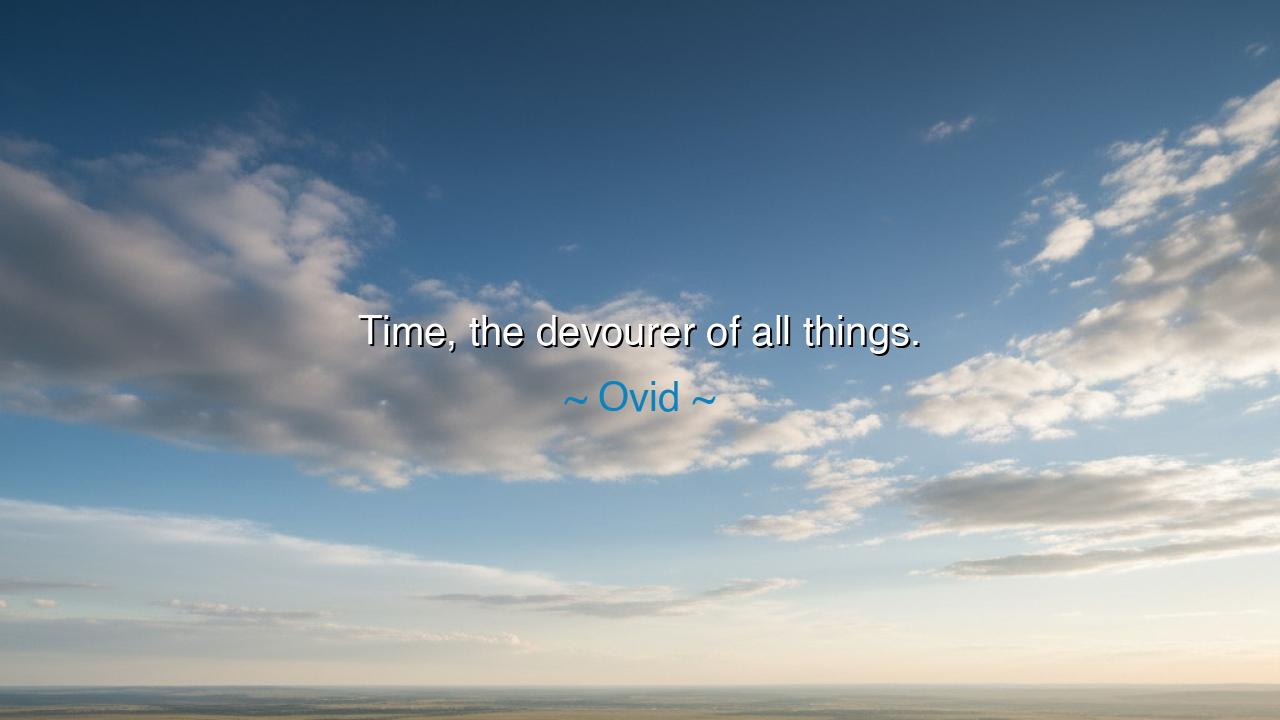
Time, the devourer of all things.






Hear, O children of the ages, the solemn cry of the poet Ovid: “Time, the devourer of all things.” This is no light phrase, no fleeting thought of an idle writer, but the thunder of eternal truth spoken by one who gazed deeply into the heart of existence. For time is not gentle; it is a predator, silent yet relentless, consuming empires and ashes alike, gnawing away at marble and memory, youth and beauty, until all things are drawn into its jaws.
The origin of this saying is found in Ovid’s Metamorphoses, where he told the tales of gods and mortals, of transformations that bound together myth and truth. Ovid lived in an age where Rome stood as the mistress of the world, yet even then he knew that time would one day humble her. He saw that even Jupiter’s throne was not beyond its reach, for time, more than any god, is eternal. His words are not despair, but warning, for he teaches us that what is built in pride may be broken in years, and that nothing of the material world escapes its devouring.
Consider the fall of the Roman Empire itself. Rome, mighty in legions, glorious in wealth, unshaken in power, believed itself eternal. Its roads stretched across continents, its aqueducts carried water like veins through the earth, its laws ordered nations. Yet time devoured it. Centuries passed, and the coliseums crumbled, the legions vanished, the throne of Caesar fell to dust. All the might of Rome could not withstand the slow, grinding hunger of time. Ovid’s words proved prophetic, echoing across the centuries.
Yet, within this harsh truth lies a paradox of hope. Though time devours all things, it also transforms them. The ruins of Greece and Rome, though broken, inspired the Renaissance. The forgotten words of poets, though buried, rise again to kindle new generations. Even as time consumes, it reshapes, and in that reshaping, greatness may endure. Ovid himself was exiled, cast away by Augustus, but his poetry outlived his punishment, devouring even the silence that sought to destroy him. Thus, what is true, what is beautiful, may survive within the very current that consumes all else.
The meaning for us is clear. Do not trust in riches, for they will fade. Do not boast of strength, for it will wither. Do not cling too tightly to the outward forms of life, for they will be devoured. Instead, turn your heart to what endures: wisdom, virtue, kindness, truth. These alone may resist the teeth of time, not by avoiding its hunger, but by passing through it into eternity. The body perishes, but the deed of justice, the word of truth, the act of love—these may outlast the centuries.
History gives us many such examples. Think of Socrates, who drank the cup of hemlock, his mortal frame consumed by time. Yet his words, his courage, his devotion to truth, live on more strongly than the stone of Athens. Time devoured the man, but not his legacy. So too with countless saints, philosophers, and reformers, whose lives were brief yet whose influence transcended ages. They proved that though time is devourer, it cannot wholly destroy that which is eternal in spirit.
Thus, the lesson is this: live with the awareness of time’s hunger, yet do not cower before it. Let its truth sharpen your resolve, for the knowledge that all things pass makes each day precious. Use your hours not for vanity, but for creation, for service, for love. Accept that time will take your flesh, your possessions, your monuments—but give it deeds that cannot die. In this way, though you too shall be devoured, your spirit shall echo beyond the grave.
So remember Ovid’s words: “Time, the devourer of all things.” Let them humble you, that you do not cling to illusions of permanence. Let them strengthen you, that you may pour your life into what endures beyond the gnawing teeth of ages. For though time devours all, it is powerless against truth, against virtue, and against the eternal flame of the human spirit.






AAdministratorAdministrator
Welcome, honored guests. Please leave a comment, we will respond soon